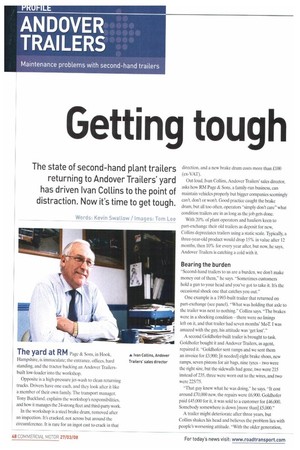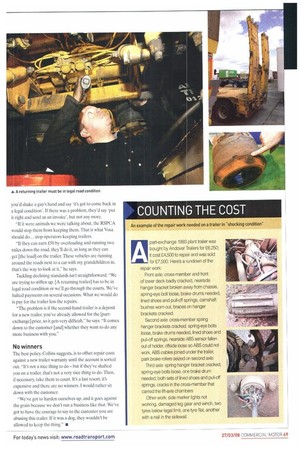Getting tough
Page 48

Page 49

If you've noticed an error in this article please click here to report it so we can fix it.
The state of second-hand plant trailers returning to Andover Trailers' yard has driven Ivan Collins to the point of distraction. Now it's time to get tough.
Words: Kevin Swatiow / Images: Tom Lee The yard at RM Page & Sons, in Hook. A Ivan Collins, Andover Hampshire, is immaculate; the entrance, offices, hard Trailers sales director standing, and the tractor backing an Andover Trailersbuilt low-loader into the workshop.
Opposite is a high-pressure jet-wash to clean returning trucks. Drivers have one each, and they look after it like a member of their own family. The transport manager, Tony Buckland, explains the workshop's responsibilities, and how it manages the 24-strong fleet and third-party work.
In the workshop is a steel brake drum, removed after an inspection. les cracked, not across but around the circumference. It is rare for an ingot cast to crack in that direction, and a new brake drum costs more than £100 (ex-VAT).
Out loud. Ivan Collins, Andover Trailers' sales director, asks how RM Page & Sons, a family-run business, can maintain vehicles properly but bigger companies seemingly can't, don't or won't. Good practice caught the brake drum, but all too often, operators "simply don't care" what condition trailers are in as long as the job gets done.
With 20% of plant operators and hauliers keen to part-exchange their old trailers as deposit for new, Collins depreciates trailers using a static scale. Typically, a three-year-old product would drop 15% in value after 12 months, then 10% for every year after, but now, he says, Andover Trailers is catching a cold with it.
Bearing the burden
-Second-hand trailers to us are a burden, we don't make money out of them," he says. -Sometimes customers hold a gun to your head and you've got to take it. It's the occasional shock one that catches you out."
One example is a 1993-built trailer that returned on part-exchange (see panel). "What was holding that axle to the trailer was next to nothing." Collins says. "The brakes were in a shocking condition there were no linings left on it, and that trailer had seven months' MoT. I was amazed with the guy, his attitude was 'get lost'."
A second Goldhofer-built trailer is brought to task. Goldhofer bought it and Andover Trailers, as agent, repaired it. "Goldhofer sent ramps and we sent them an invoice for £3,900; [it needed] eight brake shoes, new ramps, seven pistons for air bags, nine tyres two were the right size, but the sidewalls had gone, two were 215 instead of 235, three were worn out to the wires, and two were 225/75.
"That guy knew what he was doing," he says. "It cost around £70,000 new, the repairs were £6,900. Goldhofer paid £45,000 for it, it was sold to a customer for £46.000. Somebody somewhere is down [more than] £5,000."
A trailer might deteriorate after three years, but Collins shakes his head and believes the problem lies with people's worsening attitude. "With the older generation, you'd shake a guy's hand and say 'it's got to come back in a legal condition'. If there was a problem, they'd say 'put it right and send us an invoice', but not any more.
"If it were animals we were talking about, the RSPCA would stop them from keeping them. That is what Vosa should do... stop operators keeping trailers.
"If they can earn .£50 by overloading and running two miles down the road, they'll do it, as long as they can get [the load] on the trailer. These vehicles are running around the roads next to a car with my grandchildren in, that's the way to look at it,he says.
Tackling declining standards isn't straightforward. "We are trying to stiffen up. [A returning trailer] has to be in legal road condition or we'll go through the courts. We've halted payments on several occasions. What we would do is pay for the trailer less the repairs.
"The problem is if the second-hand trailer is a deposit for a new trailer, you've already allowed for the [partexchange] price, so it gets very difficult," he says. "It comes down to the customer [and] whether they want to do any more business with you."
No winners
The best policy, Collins suggests, is to offset repair costs against a new trailer warranty until the account is sorted out. "It's not a nice thing to do — but if they've shafted you on a trailer, that's not a very nice thing to do. Then, if necessary, take them to court. It's a last resort, it's expensive and there are no winners. I would rather sit down with the customer.
"We've got to harden ourselves up, and it goes against the grain because we don't run a business like that. We've got to have the courage to say to the customer you are abusing this trailer. If it was a dog, they wouldn't be allowed to keep the thing." •




























































































































































